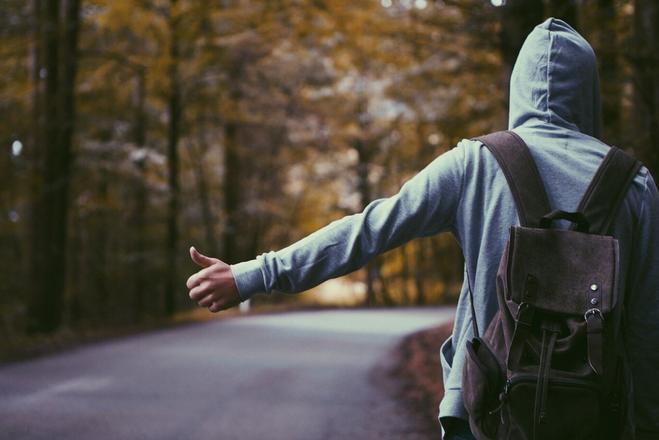Frustrated with my progress in Slovak and feeling hemmed in by Bratislava, I hit the open road (vydať sa na cesty) on an August day for a 10-day tour through Slovakia (po Slovensku). Train and hitchhiking (vlak a stopovanie) were to be my modes of transportation. I would study Slovak every night, and engage strangers in long conversations. After having lived in this country for a year and a half, it was time, linguistically speaking, to sink or swim.
The first leg of my trip began, appropriately, in Martin, the birthplace of the Slovak language in 1848 and centre of a region where the purest Slovak is spoken. Locals, for example, tend to roll their 'd's, 'l's, 'n's and 't's whenever this is required by a mekchen, meaning that the ľ in doľava - to the left - is pronounced doh-lyava, compared to the hard Bratislava 'dollava'. I had a vague connection with a family in Martin that had agreed to put me up should I ever be passing through.The first leg of my trip began, appropriately, in Martin, the birthplace of the Slovak language in 1848 and centre of a region where the purest Slovak is spoken. Locals, for example, tend to roll their 'd's, 'l's, 'n's and 't's whenever this is required by a mekchen, meaning that the ľ in doľava - to the left - is pronounced doh-lyava, compared to the hard Bratislava 'dollava'. I had a vague connection with a family in Martin that had agreed to put me up should I ever be passing through.
In one of his travel books, Bill Bryson writes that the most intractable quality of the English is their insistence that England is a big place. The opposite was true of this Martin family, who demanded I stay for more than a day and carted me here, there and everywhere (kade tade) through Slovakia, insisting our destinations were so close it would be wasteful not to see them all. We visited Levoča's churches (kostoly), which were just a kúsok (lit. a small piece) from Spišský Hrad (castle), collected mushrooms (zbierať hríby) in nearby mountains, and drove to Orava Hrad, which they again insisted was only a kúsok from Martin.
During my stay I was assailed by Slovak hospitality (pohostinnosť), which meant, first of all, being offered slippers (papuče). Even though I consider walking barefoot one of the joys of indoor living, I accepted the flip-flops to put my guests at ease, who seemed to believe that going without footwear was a sure route to dying of pneumonia. I also made sure I mastered the correct occasions on which to put on my shoes (obuť sa), take off my shoes (vyzuť sa), change my shoes (prezuť sa), and took care not to say to much on the virtues of being barefoot (bosý) compared to shod (obutý).
With my feet safely ensconced in papuče, I was led into the dining room where Slovak pohostinnosť dictated I be plyed with food and drink until I was stuffed and drunk (prežratý a ožratý). On this occasion I bravely passed out (zaspať) in the family's living room while the sun was still high in the sky. What an embarrassment (trapas). Travellers should beware of any strong drink bearing the suffix 'ica' - slivovica, jablkovica, hruškovica (plum, apple, and pear brandy) - which indicates a strong fruit-based liquor.
The next morning, epically hung over (po opici, lit. after the monkey) and exhausted (vyčerpaný), I was urged by the family not to head to eastern Slovakia as I had originally planned. There was no telling what could happen to me, the father explained, as východniari (easterners) were not normal. The mother also begged me to reconsider, painting the east as a wasteland of pickpockets (vreckoví zlodeji) and inbreds.
Judging that the cost to my health was greater in staying than departing, I headed east anyway, where I spent three relaxing days in Košice reading newspapers and studying Slovak. Besides being a relative Mecca of multi-culturalism (Hungarian is spoken on the streets, and the city is home to Slovakia's only Roma theatre), Košice is a linguistic anomaly. In Slovak, Košice is treated as a plural noun, as are the towns of Malacky, Medzilaborce, and Piešťany. This means in Slovak you can't say that Košice is beautiful (Košice je) but instead that Košice are beautiful (Košice sú).
I've been back to the east many times since that first trip. Now that my Slovak is a better, I enjoy trying to decipher its exotic dialects (nárečia). Do something silly in the east, and you may hear Co ty šaleny? (lit. What, are you nuts?) instead of the western Slovak Čo si šibnutý? In many places in the east, stress is placed on the second syllable, a nuance that makes the language far more musical than Bratislava's nasal, phlegmatic twang. And in Slovakia's northeast corner, some 100,000 people speak a language (rusínčina) somewhere between Slovak and Ukraine.
But in all my trips (výlety) po Slovensku, the loveliest dialects I've heard are those of the Liptov (northern) and Záhorie (western) regions, although Slovaks may disagree. In Liptov, certain adjectives end in 'ô' (pronounced: 'whoa') rather than 'e'. (example: peknô dievča, pretty girl), while in Záhorie, some l's are pronounced as English w's, reminding one of cartoon character Elmer Fudd.
There's a joke about a Záhorie boy, aged 4, who has never said a word his entire life. At a family wedding his father gives him a glass of red wine. The boy takes a sip and says, "sour." "My boy," says the father. "You can talk. Why haven't you ever said anything sooner?" The boy says, "Nebylo o čem." (correct Slovak: nebolo o čom), or "There was never anything to talk about."
This story was first published by The Slovak Spectator on May 28, 2001. We have updated the piece to keep it relevant for today.

